Pagine
Condividi e segnala
Tag
- Althusser
- Antropologia
- Baumgarten
- Bourdieu
- Conceivability of Nothingness
- Conciliation
- corpo
- Derrida
- Dialectics
- Difference
- distinzione
- Europe
- Expression
- giudizio
- Grace
- Habitus
- Heidegger
- Hobbes
- Kant
- linguaggio
- Lyotard
- marxismo
- Medieval Aristotelianism
- Metaphysics
- Nature
- Negative
- Nichts
- nihil
- Nihilism
- nihil negativum
- nihil privativum
- Non-identical
- Nothing
- Nothingness
- onore
- politica
- postmoderno
- pratica
- riconoscimento
- Smith
- solitudine
- Sovranità
- Spinoza
- Thomas Aquinas
- Western Ontology
-
Articoli recenti
Link
Archivi categoria: NUMERO 6
Consecutio rerum 6, anno III (2/2018-2019)
TECHNE, TECNICA, TECNOLOGIA
a cura di Roberto Finelli e Pierluigi Marinucci

Immagine di copertina: Valeria Cademartori, Dismissioni, 2007. Su gentile concessione dell’autrice.
… Continua a leggere
Pubblicato in NUMERO 6
Lascia un commento
Indice
Editoriale
ROBERTO FINELLI, Paradigma della “Tecnica” e paradigma del “Capitale”
Monografica
- Storia delle idee
ROBERTO FINELLI, La dottrina della verità senza la dottrina della città. Per una critica della teoria heideggeriana della tecnica.
MARIANNINA FAILLA, La techne medica tra innovazione e anticipazione
MARTA LIBERTÀ DE BASTIANI, La politica come téchne. Storia antica e pragmatismo politico nel Tacitismo e in Botero.
NURIA SÁNCHEZ MADRID, Una técnica verosímil para explorar el ánimo. El pensamiento incosciente en las Lecciones sobre antropología de Kant
MARCO COSTANTINI, Il giudizio, la natura, la tecnica. Frammenti di ricerca sulla filosofia
… Continua a leggere
Pubblicato in NUMERO 6
Lascia un commento
Editoriale. Paradigma della “Tecnica” e paradigma del “Capitale”
Roberto Finelli
Università degli Studi Roma Tre
roberto.finelli@uniroma3.it
Pubblicato in NUMERO 6
Lascia un commento
La dottrina della verità senza la dottrina della città. Per una critica della teoria heideggeriana della tecnica.
Roberto Finelli
Università degli Studi Roma Tre
roberto.finelli@uniroma3.it

Valeria Cademartori, Dismissioni, 2007. Su gentile concessione dell’autrice.
Abstract: Martin Heidegger’s philosophy linked the question of “technique” with the reproposal, in modern terms, of the ancient and medieval category of Being. The purpose of this essay is to demonstrate 1) that the conception of Being as an absolute principle of reality belongs to a primitive and archaic stage of Greek philosophy, still profoundly influenced by a culture of magism and language; 2) that the principle of an ontology distorted by an inadequate philosophy of language cannot be … Continua a leggere
Pubblicato in NUMERO 6
Lascia un commento
La techne medica tra innovazione e anticipazione
Mariannina Failla
Università degli Studi Roma Tre
mariannina.failla@uniroma3.it

Abstract: The following words are not meant to be new, and after all they cannot be if we think that the new has “always an ancient heart”, as Carlo Levi wrote in one of his books, bringing out the Jewish meaning of memory as the formation of civil consciousness. If not new, they don’t give up innovative reflections on medical art and therefore on the techne addressed to the human being, understood as a psycho-physical complex and not as a body machine. We want to highlight the precious … Continua a leggere
Pubblicato in NUMERO 6
Lascia un commento
La politica come techne. Storia antica e pragmatismo politico nel Tacitismo e in Botero
Marta Libertà De Bastiani
Università degli Studi Roma Tre
martalibertadebastiani@gmail.com
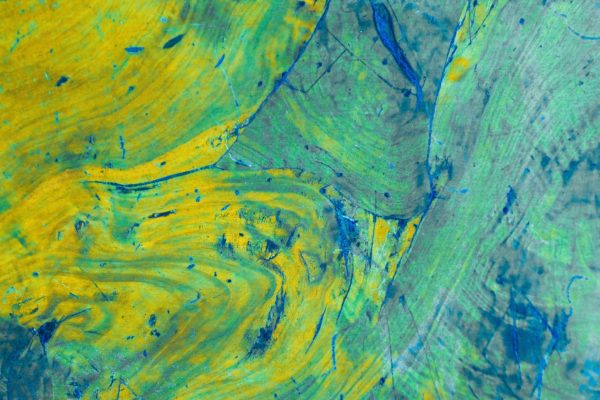
Abstract: In this paper I argue that, following Machiavellian tradition and theory of politics, the authors who may be labelled as Tacitists understand politics as a téchne, a set of governmental practices and techniques oriented towards the maintaining of political order. These practices, which compose the virtue of prudence, are defined through the consideration of historical experience as a theater, a stage where every political problem and its proper solution has already been shown. In Tacitists’ treatises, the historical facts, mainly excerpted from Tacitus and the … Continua a leggere
Pubblicato in NUMERO 6
Lascia un commento
Una técnica verosímil para explorar el ánimo. El pensamiento incosciente en las Lecciones sobre antropología de Kant
Nuria Sánchez Madrid
Universidad Complutense de Madrid
nuriasma@ucm.es

Abstract: This paper aims at giving an account of Kant’s treatment of unconscious representations in his Lectures on Anthropology and Logic, highlighting Kant’s disavowal of a theoretical inquiry of this kind of representations of the mind and his claim of the existence of a pragmatic technique for addressing them. First I tackle Kant’s misgivings against the hypothesis to cast light over the dark side of the mind, drawing as conclusion that the logical unity of apperception remains the unique path giving access to it. Second I give … Continua a leggere
Pubblicato in NUMERO 6
Lascia un commento
Il giudizio, la natura, la tecnica. Frammenti di ricerca sulla filosofia critica di Kant
Marco Costantini
Università degli Studi di Roma “Tor Vergata”
m.costantini@live.it
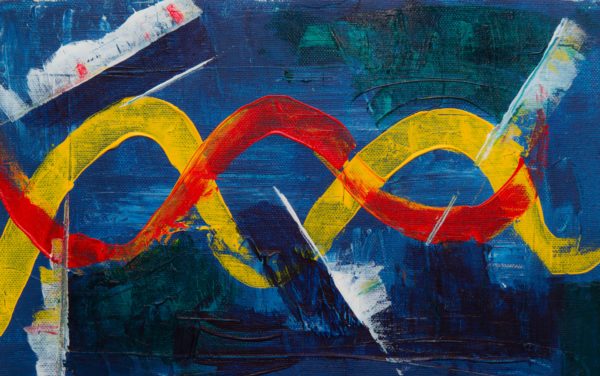
Abstract: The contribution consists of some fragments that examine, within the Kantian critical texts, in particular within the Kritik der reinen Vernunft and the Kritik der Urteilskraft, three different types of judgment, the aesthetic, the artistic and the teleological, in the attempt to bring out the fundamental connection that the judgment in general tightens with a certain concept of nature and a certain concept of technique, which cannot be traced to the universal mechanism defined by the pure intellect.
Keywords: Kant; Judgment; Nature; … Continua a leggere
Pubblicato in NUMERO 6
Lascia un commento
The First and Modern Notion of Technology: from Linnaeus to Beckmann to Marx
Guido Frison
UCL, Department of Anthropology
g.frison@ucl.ac.uk; frison.guido@gmail.com
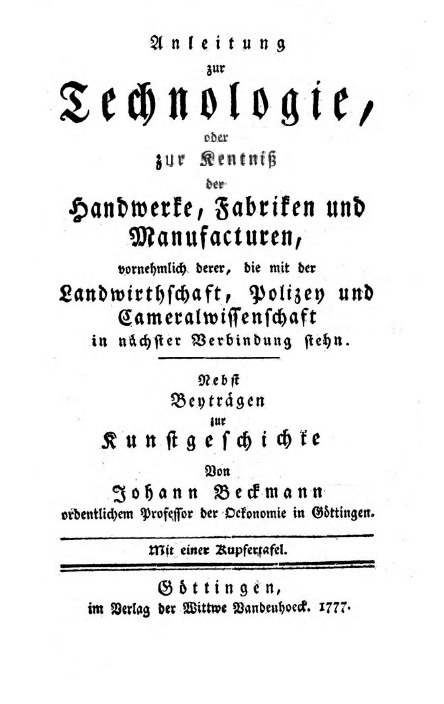
Abstract: The paper shows that the English language has great limitations in the treatment of the concept technology, and provides a rough but necessary taxonomy of the main uses of the term ‘technology’ in the present Anglo-Saxon debate on social sciences and humanities. Then, it shows the first steps of the modern notion of technology, which formerly referred to rhetoric and philology. Christian Wolff (1679 – 1754) introduced the notion of Technologia (in Latin) with little success within a philosophical essay in 1728. The actual development of technology (… Continua a leggere
Pubblicato in NUMERO 6
Lascia un commento
La tecnologia al servizio del capitale. La teoria marxiana della tecnologia alla luce dell’interpretazione di Raniero Panzieri
Andrea Cengia
Università degli Studi di Padova
andrea.cengia@gmail.com

Abstract: This paper is a part of a larger research included in my PhD dissertation. The main aim of the paper is to define an outline of a theory of technology as a part of a critique of political economy. The starting point is identified in the work of Raniero Panzieri, who in the early Sixties combines theoretical analysis of Marx’s Capital with the factory investigation. Panzieri’s research indicates the non-neutrality of Technology applied to production processes. Panzieri’s conclusions lead to return to Marx theory. Starting from these … Continua a leggere
Pubblicato in NUMERO 6
Lascia un commento
Intelligenza artificiale e algoritmi: datificazione, politica, epistemologia
Teresa Numerico
Università degli Studi Roma Tre
teresa.numerico@uniroma3.it

Abstract: The aim of the present paper is to show the evolution of the concept of Artificial Intelligence (AI) and of the different technical methods that progressively informed and organized this concept. The article presents a view of the evolution of such a notion: 1) with special regards to the social, political and epistemological consequences of the chosen technical solutions, 2) with special attention to the parallel transformation of the human intelligence concept. The recent major successes of AI are based on datification and availability of huge quantity … Continua a leggere
Pubblicato in NUMERO 6
Lascia un commento
L’uomo senza dimensione. Viaggio intorno agli ossimori del “mondo digitale”
Carmelo Albanese
Sapienza Università di Roma
ca.albanese@tiscali.it

Abstract: One-dimensional man of which Marcuse wrote is the ancestor of the contemporary digital man, who through the progressive loss of critical capacity is no longer anchored even to that single dimension which the author already indicated as the collapse of human rationality. In the seventies of the twentieth century, capitalism sought to overcome the resistance of public opinion in the face of technological productions functional to the war, formulating oxymorons that aspired to become customary terms: the “father of the H-bomb”. In the absurd synthesis of terms attributable … Continua a leggere
Pubblicato in NUMERO 6
Lascia un commento
Intervista a Gerhard Banse su “Tecnica e Tecnologia”
a cura di Roberto Finelli e Pierluigi Marinucci
Gerhard Banse
Berlin Centre Technology & Culture
gerhard.banse@t-online.de
Roberto Finelli
Università degli Studi Roma Tre
roberto.finelli@uniroma3.it
Pierluigi Marinucci
Sapienza Università di Roma
pierluigimarinucci4@gmail.com

Bionote: Gerhard Banse is President of the Leibniz-Sozietät (Berlin). He was a member of the Karlsrhuer Institut fur Technologie and of the Academy of Sciences of the German Democratic Republic. He edited the entries Technik e Technologie of the Wörterbuch zu den philosophischen Fragen der Naturwissenschaften (Dietz Verlag, Berlin 1983). He is one of the most prominent researcher about Technology and its polysemous significance. … Continua a leggere
Pubblicato in NUMERO 6
Lascia un commento
The Politics of (Postcolonial) History: The case of Provincializing Europe
Vasant Kaiwar
Duke University
(vkaiwar@duke.edu)

Abstract: The critique of what is called postcolonial-studies in the Anglophone metropolitan academy that is elaborated in this paper, takes place via a detailed engagement with one of its most important recent texts, Dipesh Chakrabarty’s Provincializing Europe: Postcolonial Thought and Historical Difference (2000). It is intended to enable fresh critical thinking about the claims of postcolonial-studies to represent a subversive approach to history, politics, etc. It also engages the claims of postcolonial-studies regarding the limits of Eurocentrism, i.e. the tendency to view world history through the lens of European developments. The … Continua a leggere
Pubblicato in NUMERO 6
Lascia un commento
La “nuda vita” in Aristotele A partire da Giorgio Agamben
Giulia Angelini
Università degli Studi di Padova
giulia.angelini@phd.unipd.it

Abstract: This paper focuses on the Agambenian interpretation of Aristotle, which arises from the analysis of the relation between “ζωὴ” and “βίος” and of the figure of the slave. The aim of the work is the following: on the one hand, we will follow Agamben and his revision of the Aristotelian thought, which leads him to elaborate the crucial notion of “bare life”; on the other hand, we will verify whether the possibility to trace such a notion back to Aristotle is legitimate.
Keywords: Agamben; “Bare … Continua a leggere
Pubblicato in NUMERO 6
Lascia un commento
Dal riconoscimento al socialismo: la teoria della giustizia di Axel Honneth
Francesco Leone
Università degli Studi di Bari
francescoleone1985@libero.it

Abstract: The aim of this paper is to retrace the philosophical developments of Axel Honneth’s social theory after his rediscovery of Hegel’s Philosophy of Right. In Freedom’s Right, Honneth’s original normative theory of society based on recognition leaves room for a normative theory of institutions grounded on the concept of social freedom. Honneth uses the Hegelian methodological procedure of normative reconstruction to develop a theory of justice based on social analysis. The resort of a teleological philosophy of history makes possible the normative reconstruction and justify … Continua a leggere
Pubblicato in NUMERO 6
Lascia un commento
Recensione a Marco Maurizi, Quanto lucente la tua inesistenza. L’Ottobre, il Sessantotto e il socialismo che viene (Jacabook 2018)
Domizio Saquella
Università degli Studi di Bologna
domizio.s@hotmail.it
Pubblicato in NUMERO 6
Lascia un commento
Recensione a Cathy O’Neil, Armi di distruzione matematica (Bompiani, 2017
Pubblicato in NUMERO 6
Lascia un commento

 …
… 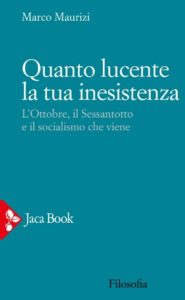 …
… 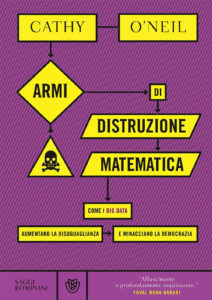 …
… 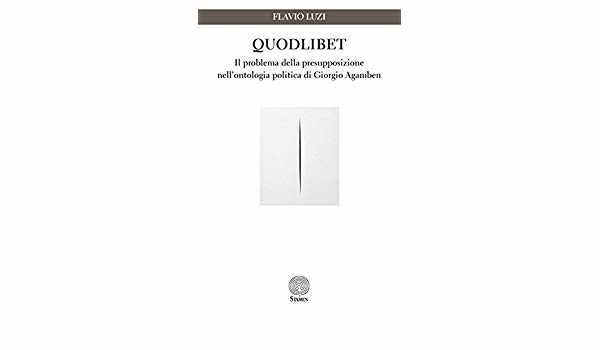 …
…